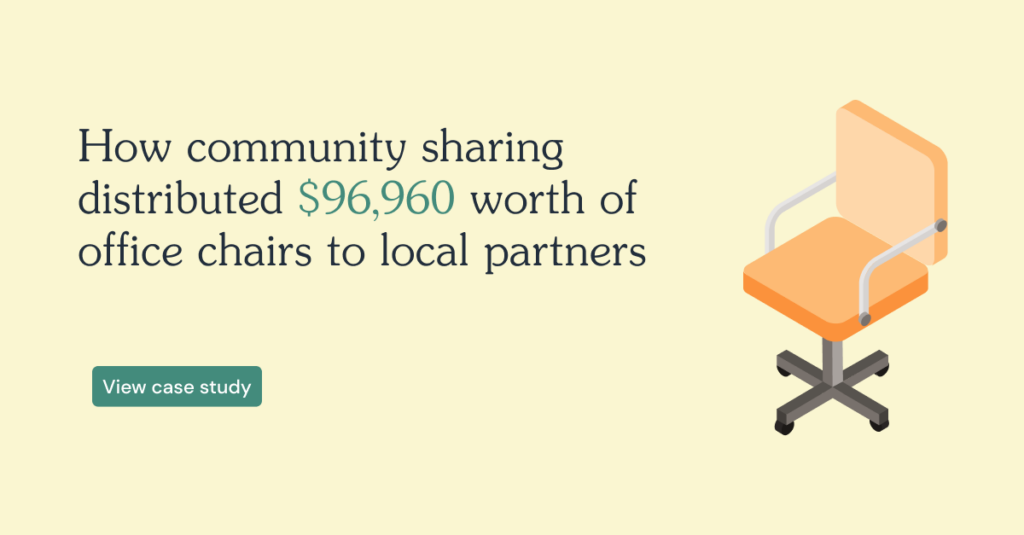Surplus Marketplace
Rheaply puts reuse on the table for every organization.
Surplus marketplace
Part of managing a successful business requires a well-thought-out approach to managing surplus assets, and one of the best ways for businesses to do that is by relying on surplus marketplaces. A surplus marketplace generally refers to a platform that allows businesses and other organizations to buy and sell surplus or excess inventory.
These marketplaces provide a unique and invaluable opportunity for enterprises to liquidate excess inventory and recover some of their initial costs. Not only that, but businesses can purchase this excess inventory at discounted prices, which provides an opportunity to save on procurement costs as well. In recent years as recycling and sustainability efforts have grown in popularity among businesses, so too has the popularity of surplus marketplaces grown, and they have become a critical component of the supply chain for many organizations both small and large.
But exactly what is a surplus marketplace? A surplus marketplace is an online platform that connects both buyers and sellers of excess inventory in an effort to reduce wastefulness. These marketplaces allow enterprises to sell off their surplus or excess inventory to other businesses and institutions. By doing so, they can recover some of the costs associated with procuring the inventory and free up valuable space in warehouses or other facilities. Similarly, buyers can purchase excess inventory at discounted rates, enabling them to reduce procurement costs. There are numerous surplus marketplace examples that businesses can find with a quick internet query.
The concept of surplus marketplace generally refers to the difference between the cost of producing or acquiring a product and the price at which it is sold. When an organization produces or acquires more inventory than it can sell, it results in a surplus. This surplus is sometimes an economic loss for the business because the business has invested resources in producing or acquiring the inventory but it will not recover the full cost of it. By selling the surplus materials on a surplus marketplace, the business can recover at least some of the initial costs and reduce the impact of the economic loss.
Sustainability platforms
In general terms, a sustainability platform is a digital platform that facilitates sustainable practices and promotes some of the main principles of circular economics. Sustainability platforms can connect businesses, individuals, and organizations to exchange resources, share knowledge and best practices, and promote mutually beneficial, sustainable solutions. There are materials exchange platforms, carbon offset marketplaces, sustainability reporting platforms, and others.
A surplus marketplace, for instance, is a type of sustainability platform that enables the exchange of surplus or excess inventory between businesses and/or institutions. By connecting buyers and sellers of excess inventories, surplus marketplaces help to reduce waste and promote equitable reuse of resources, which is one of the key principles of a circular economy. Similarly, resource exchange platforms allow businesses to exchange raw materials, components, or by-products that can be reused in other production processes. These exchanges go a long way to help reduce waste and promote more sustainable business practices and uses of non-renewable resources.
Sustainability platforms in general are important within circular economies because they promote the reuse, sharing, and recycling of certain resources. They can help businesses and organizations transition from a linear model of production and consumption to a circular one where waste is minimized and resources are kept in use for as long as possible. By doing so, sustainability platforms help significantly reduce the environmental impact of certain economic activities and contribute to the achievement of an organization’s sustainability goals. Because of this, surplus marketplaces and other sustainability platforms play an invaluable role in promoting the principles of a circular economy.

Circular economy and sustainability strategies
A circular economy is an economic system of production and consumption that attempts to maximize the use of various resources by keeping them in use for as long as possible. Within a circular economy, materials are reused, recycled, refurbished, or regenerated in order to create new products or services and reduce waste as a byproduct. The concept of a circular economy is intimately intertwined with sustainability efforts, as both seek to reduce the environmental impact of economic activities while still promoting economic growth and social well-being.
Circular economy and sustainability strategies are closely interlinked, and implementing circular economy strategies is one of the most effective ways for businesses to achieve sustainable development. By promoting the strategic and efficient use of resources, a circular economy can reduce the negative impact of economic activities on the environment while simultaneously creating economic opportunities and other social benefits. Circular economy and sustainability initiatives can help businesses reduce their carbon footprint, conserve natural resources, and decrease waste – all of which are important elements of sustainability strategies.
Adopting circular economy principles can also help businesses become more resilient and more competitive, as they reduce their reliance on scarce, non-renewable resources and create new revenue streams via the reuse and recycling of certain materials. For example, by utilizing recycled materials in products and/or services, businesses can significantly reduce production costs and enhance their brand image by adhering to more sustainable practices.
Advantages of sustainable procurement
Sustainable procurement refers to the process of businesses purchasing goods and services that have a less significant impact on the environment, respect for human rights, and the promotion of social and economic development. A sustainable procurement policy could help bring several advantages to businesses and organizations, including environmental, social, and economic benefits.
One of the key advantages of sustainable procurement is that it can provide businesses with actionable ways to reduce their impact on the environment. By choosing to work with suppliers that use more sustainable practices (including the use of renewable energy, water conservation, low-carbon transportation, etc.), businesses can greatly reduce their carbon footprint and help mitigate their contribution to climate change.
Sustainable procurement can also yield various social benefits by promoting fair labor practices and recognizing human rights. By working with suppliers and vendors that respect workers’ rights (by providing fair wages, safe working conditions, and healthcare benefits), businesses contribute to the improvement of laborers’ living standards and reduce the risk of human rights abuses.
Other sustainable procurement examples may include choosing suppliers that offer organic or fair-trade products, utilizing renewable energy sources for transportation, manufacturing, and storage, and incorporating sustainability criteria within the supplier/vendor selection process.
Green purchasing in procurement
Green purchasing, another essential element of sustainable procurement, involves the purchasing of goods and services that have a lower environmental impact. The process involves integrating environmental criteria into the initial procurement process with the aim of reducing the negative impacts of economic activities on the environment (things like utilizing non-renewable resources, pollution, dumping, etc.).
A green procurement policy could help guide businesses on how to integrate more environmental considerations into their procurement decisions. Such guidelines usually include criteria such as energy efficiency, waste reduction, material efficiency, and product recyclability. Some other green procurement guidelines could include:
- Purchasing energy-efficient products that require less energy to utilize and generally have longer lifespans
- Utilizing products made from recycled materials in an effort to reduce waste and promote sustainability efforts
- Working with suppliers that have a sustainable manufacturing process that reduces carbon emissions and seeks to preserve natural resources and habitats
- Purchasing products that can be repaired easily and ultimately recycled
Rheaply provides businesses and other organizations with a helpful platform to connect and exchange surplus resources. The resource exchange program enables businesses and institutions to list their surplus resources like equipment, supplies, furniture, and other materials that are no longer needed but could still be useful to other businesses or organizations. Similarly, the listing program provides businesses with access to a wide variety of resources at affordable rates.
In summation, green purchasing in procurement is a vital element of sustainable procurement efforts that promotes environmentally responsible purchasing practices. Green procurement policies and guidelines can enable businesses and organizations to integrate environmental considerations into their procurement decisions which have both financial advantages as well as social benefits.


